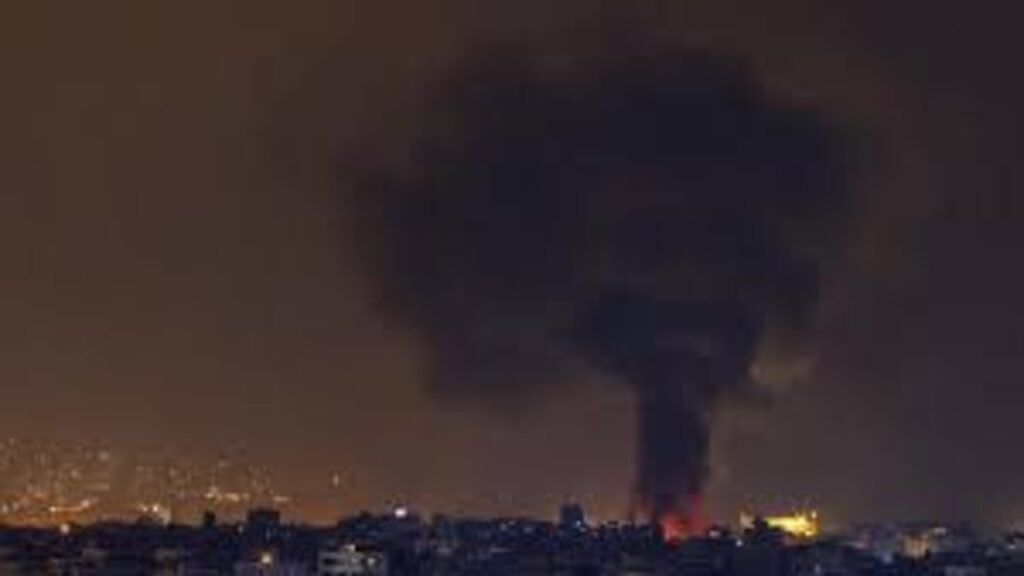In the early hours of June 13, 2025, the Middle East witnessed a dramatic escalation as Israel launched Operation Rising Lion, a massive military strike targeting Iran’s nuclear facilities, military bases, and key leaders. Described by Israeli Prime Minister Benjamin Netanyahu as a mission to protect Israel’s survival, the operation has sent shockwaves across the world, raising fears of a wider war.
A Daring Strike at Dawn
At around 1:00 a.m. local time in Tehran, explosions lit up the sky as Israeli fighter jets, including F-35 stealth aircraft, struck over 100 targets across Iran. The main focus was the Natanz nuclear facility in Isfahan province, Iran’s largest uranium enrichment site, where fires and thick black smoke were reported. Other nuclear sites in Khondab and Khorramabad were also hit, along with military bases and missile factories. The Israeli Defense Forces (IDF) used over 330 precision-guided bombs and cruise missiles in what they called a “preemptive” attack to stop Iran from building nuclear weapons.
Netanyahu, in a televised speech, said, “We struck at the heart of Iran’s nuclear program. This operation will continue for as many days as it takes to remove this threat.” He claimed Iran was dangerously close to producing a nuclear bomb, with enough enriched uranium for up to nine atomic weapons. The IDF also confirmed the deaths of key Iranian figures, including General Hossein Salami, head of the Islamic Revolutionary Guard Corps (IRGC), Major General Mohammad Bagheri, Iran’s military chief, and nuclear scientists like Fereydoun Abbasi-Davani and Mohammad Mehdi Tehranchi.
Iran’s Response and Retaliation
Iran was quick to react. By Friday morning, it launched over 100 drones toward Israel, though the IDF said most were intercepted. Iran’s Supreme Leader, Ayatollah Ali Khamenei, vowed “severe punishment” for what he called a “crime against our beloved country.” Iranian state media reported damage to residential areas in Tehran and at least 50 injuries, including women and children, but no radioactive leaks from Natanz. Iran’s airspace was closed, disrupting flights, including some Air India routes, and a state of national mourning was declared.
The strikes came just after Iran announced plans for a third nuclear enrichment site, following criticism from the United Nations’ nuclear watchdog for not cooperating with inspections. This timing suggests Israel acted to stop Iran’s nuclear progress before it could advance further.
Why Now?
For years, Israel has viewed Iran’s nuclear program as a major threat, fearing a nuclear-armed Iran could endanger its existence. Tensions have grown since Iran’s missile attacks on Israel in 2024, which followed the Gaza conflict that began on October 7, 2023. Israel’s Operation Rising Lion was triggered by intelligence suggesting Iran could produce a nuclear weapon within months, a claim Tehran denies. The attack also follows a leaked CIA report about Israel’s plans, raising questions about how Israel managed such a complex operation without U.S. support.
The operation involved over 200 aircraft and was supported by Israel’s Mossad, which reportedly smuggled weapons into Iran to weaken its defenses. Strikes targeted not just nuclear sites but also Iran’s ballistic missile program, which Israel says could carry nuclear warheads in the future. Netanyahu warned that Iran’s missiles could one day threaten Europe and even America, framing the attack as a defense of global security.
A Risky Move with Big Questions
Operation Rising Lion is one of Israel’s boldest military actions, but it comes with risks. Experts say Iran’s nuclear facilities, like Natanz, are heavily fortified, and while surface damage was reported, the underground parts may still be operational. Past Israeli attacks, like the 2021 sabotage at Natanz, only slowed Iran’s nuclear work, and some fear this strike could push Tehran to speed up its program in defiance.
The loss of key Iranian leaders, including Salami and Bagheri, weakens Iran’s military, but it may also strengthen hardliners who want revenge. Iran’s weakened allies, like Hezbollah in Lebanon and Hamas in Gaza, could limit its ability to fight back through proxies, but a direct response remains possible.
What Happens Next?
As Operation Rising Lion continues, the world watches anxiously. Israel has lifted its shelter orders but remains on high alert, expecting more Iranian drones or missiles. The International Atomic Energy Agency (IAEA) warned that attacks on nuclear sites could have “serious implications” for safety and peace.
This conflict is a reminder of how quickly tensions can escalate. Operation Rising Lion may have delayed Iran’s nuclear ambitions, but it has also opened a dangerous new chapter in the Middle East, with consequences that could reach far beyond Tehran and Jerusalem.

